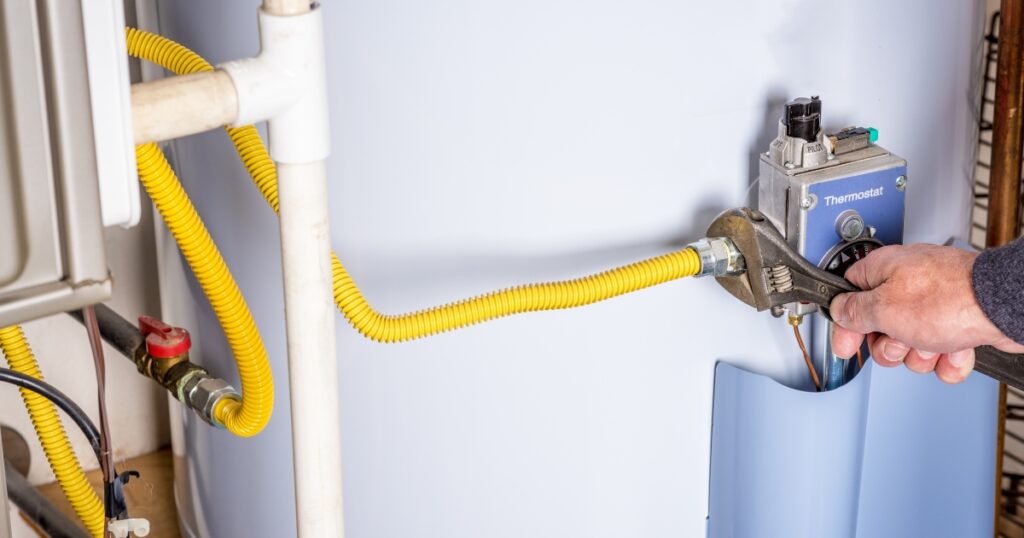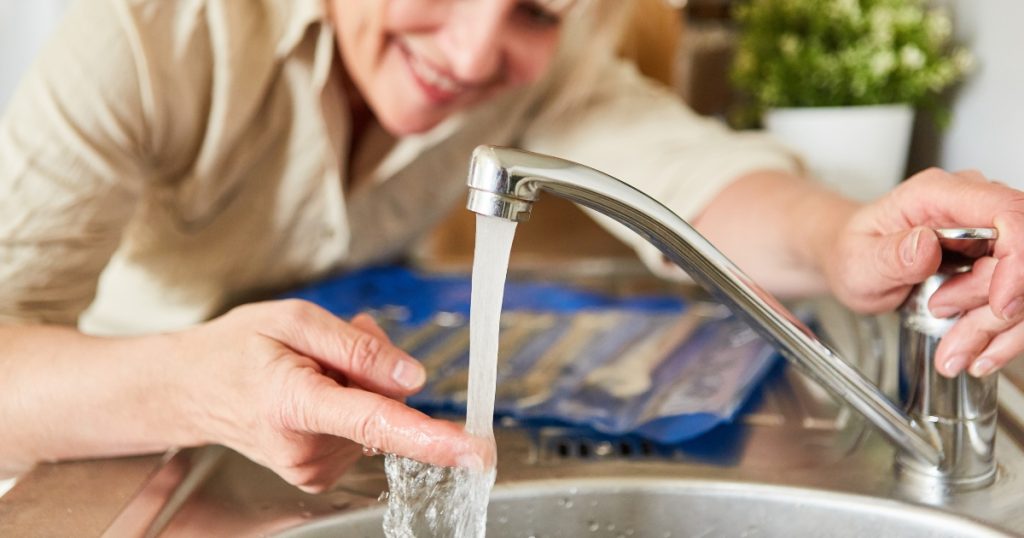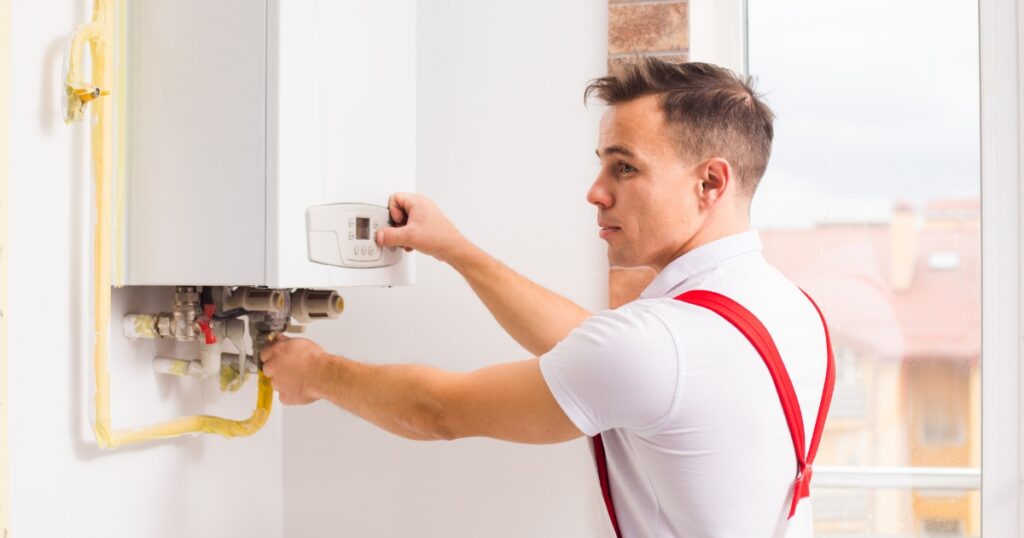Ever copped a chilly surprise mid-shampoo because your trusty hot shower went rogue and turned icy on ya? Or maybe the water’s just been feeling a bit off lately. Yeah, we know how much of a head-scratcher that can be – it’s a right pain and it happens in too many Aussie homes for our liking.
In this yarn, we’re gonna have a chinwag about why keeping the water quality up to snuff is crucial to avoid shelling out heaps for repairs and helping your hot water system chug along without throwing a wobbly.
Key Takeaways
- Regular flushing of hot water systems prevents sediment and mineral buildup, which is key to ensuring the system runs efficiently and avoids unnecessary repairs.
- Checking and replacing anode rods as needed can prevent rust and corrosion in your hot water system, extending its lifespan and maintaining high-quality water.
- Hard water containing minerals like calcium and magnesium can damage your plumbing over time; installing a water softener or using descaling agents helps treat hard water, protecting your appliances.
- Professional plumbers play a vital role in maintaining the health of your hot water system by providing expert inspections, cleaning, testing, and guidance on treatment solutions.
- Homeowners must keep their hot water system temperatures set around 60 degrees Celsius to stop bacteria from growing without risking increased mineral buildup or energy waste.
The Importance of Water Quality in Hot Water Systems
Good water quality is essential for the efficiency, longevity, and maintenance needs of hot water systems. Without it, you could be facing costly repairs and replacements sooner than expected.
Let’s dive deeper into how water quality impacts your hot water system.

Impact on efficiency, longevity, and maintenance needs
High-quality water is essential to keeping our hot water systems running smoothly and economically. Water laden with minerals, sediment, or contaminants forces these systems to work harder, which can lead to increased energy usage and higher bills.
By ensuring the water in our systems is clean, we protect delicate heating elements from premature wear and keep efficiency at its peak.
Let’s face it: no one wants frequent repair calls or early replacement of a hot water system due to avoidable issues like corrosion or limescale buildup. Regular maintenance tasks such as checking anode rods for effectiveness and flushing out sediments extend the life of our appliances.
Taking care of the quality of water flowing through our pipes means less downtime for repairs and more consistent, reliable access to hot water whenever we need it.
Identifying Common Water Quality Issues
If you’ve noticed discoloured, smelly, or cloudy water, reduced water flow and pressure, sediment buildup and corrosion, or bacterial growth in your hot water system, it’s important to address these issues promptly for the long-term health of your plumbing.
To learn more about the impact of water quality on hot water systems and how to prevent potential repairs, keep reading.
Discoloured, smelly, or cloudy water
Discoloured, smelly, or cloudy water signals potential water quality issues that can impact the performance of your hot water system. It may be an indication of sediment buildup, bacterial growth, or even corrosion in your plumbing system.
Timely intervention is crucial to prevent further damage and maintain the efficiency of your hot water appliance.
Addressing discoloured or smelly water promptly helps prevent staining and odour concerns while also safeguarding against health risks associated with poor water quality. Implementing regular maintenance practices like flushing the system and checking anode rods can help mitigate these issues and ensure a consistent supply of clean, high-quality hot water for your household needs.
Reduced water flow and pressure
Reduced water flow and pressure can indicate underlying water quality issues in your hot water system. These problems are often caused by sediment buildup and corrosion within the plumbing, affecting the efficiency of your hot water supply.
Addressing these issues promptly is crucial to ensure uninterrupted access to hot water for daily use. Neglecting this may lead to a heightened risk of further damage and increased maintenance costs over time.
Regular monitoring and maintenance of your hot water system are essential in addressing reduced water flow and pressure, as well as safeguarding against potential long-term damage.
By taking proactive measures, you can ensure that your household has reliable access to clean, high-quality hot water while mitigating the risk of unexpected repairs or replacements.
Sediment buildup and corrosion
Ensuring your water system operates efficiently involves addressing issues such as reduced flow and pressure, and sediment buildup or corrosion. These problems are often caused by poor water quality, leading to operational inefficiency and increased maintenance costs.
Sediment accumulation in your hot water tank can reduce its heating capacity and cause corrosion, further impacting the system’s lifespan.
Corrosion prevention is essential for maintaining a healthy water supply. Water with high mineral content increases the likelihood of sediment buildup in pipes and appliances, affecting their performance.
Bacterial growth
Sediment buildup and corrosion can lead to bacterial growth in hot water systems. Bacteria thrive in warm, damp environments, making your hot water system an ideal breeding ground if left untreated.
The presence of bacteria can not only affect the quality of your water supply but also pose health risks for you and your family.
Bacterial growth can result in foul odours, discoloured water, and even potential contamination that may cause illness when consumed or used for bathing. Regular maintenance and monitoring of your hot water system are essential to prevent bacterial growth from occurring, ensuring safe and clean water for everyday use.

Causes of Water Quality Issues
Corroded anode rods, hard water buildup and scale, and ineffective anode rods are common causes of water quality issues in hot water systems. These factors can lead to reduced efficiency, increased maintenance needs, and even system failures if left unaddressed.
Corroded anode rods
Anode rods play a crucial role in protecting hot water systems from corrosion. Over time, anode rods can become corroded due to the chemical reactions they undergo. It’s essential to check and replace corroded anode rods regularly, as they are designed to sacrifice themselves by corroding first before other metal parts of the system.
Neglecting this maintenance task can lead to accelerated corrosion of the tank and result in costly repairs or even premature failure of the hot water system.
Regular inspection and replacement of corroded anode rods are vital for extending the lifespan and efficiency of your hot water system. By ensuring that your anode rods are in good condition, you can prevent further damage caused by corrosion, maintain good water quality, and keep your energy costs down.
Hard water buildup and scale
Hard water buildup and scale affect the efficiency of hot water systems. These mineral deposits, mostly calcium and magnesium, can clog pipes, reducing water flow and increasing energy consumption.
Over time, scale buildup can lead to corrosion in the system, impacting its longevity and causing maintenance issues. Treating hard water is essential to prevent these problems.
Removing hard water buildup requires regular flushing of the system and installing effective filtration systems. Additionally, treating hard water by using water softeners or descaling agents prevents scale formation in the first place.
Ineffective anode rods
Ineffective anode rods contribute to water quality issues in hot water systems. When anode rods are not functioning properly, they fail to protect the tank from corrosion. This can lead to rusty or discoloured water and reduce the lifespan of your hot water system.
Replacing ineffective anode rods is crucial for preventing corrosion and maintaining good water quality in your hot water system.
An inefficient anode rod allows sediments and minerals to accumulate inside the tank, affecting both the quantity and quality of hot water produced. Regularly checking and replacing anode rods is essential for keeping your hot water appliance in optimal condition, reducing repair costs, and ensuring clean, safe drinking water for you and your family.
Maintaining Water Quality for Hot Water Systems
Regular maintenance is crucial in ensuring the longevity and efficiency of your hot water system. Learn more about effective ways to maintain water quality for your hot water systems by reading our blog.
Flushing the system
- Drain and flush out the water heater to remove sediment and mineral build-up, ensuring optimal performance and efficiency of the unit.
- Turn off the power supply or gas to the water heater before beginning the flushing process to ensure safety.
- Connect a hose to the drain valve at the base of the water heater and direct the other end to a suitable drainage location or outdoor area.
- Open a hot water tap in your home to release pressure as you drain the tank.
- Carefully open the drain valve on your water heater, allowing water to flow out through the hose until it runs clear of sediment and debris.
- Close off the drain valve once all sediments are flushed out, then disconnect and stow away the hose before turning on the cold-water supply to refill and potentially flush out any remaining sediment.
- Verify that all valves are securely closed once refilled before restoring power or gas supply, then check for leaks after turning on your hot water tap again.
Checking and replacing anode rods
To ensure the efficiency and longevity of your hot water system, it’s important to regularly check and replace anode rods. Here are some simple steps to follow:
- Periodically inspect the condition of the anode rod by unscrewing it from the top of the water heater. A worn-out anode rod will be significantly corroded.
- Measure the thickness of any remaining core wire in the anode rod. If it is less than half an inch thick, it’s time for a replacement.
- When replacing the anode rod, ensure that you select the correct type for your water heater model and install it securely to prevent any leaks or corrosion.
- After replacing the anode rod, flush out any sediment buildup from the bottom of the tank to maintain water quality and prevent corrosion.
- In homes with hard water, consider installing a powered or electronic anode as an alternative to traditional sacrificial rods to address hard water issues effectively.
- Regularly monitor chlorine levels in your water supply if applicable, as high chlorine levels can accelerate corrosion.
- Seek professional plumbing services if you are unsure about checking or replacing anode rods to maintain your hot water system effectively.
Setting appropriate temperatures
Setting appropriate temperatures is crucial for maintaining water quality in hot water systems. It helps prevent bacterial growth and corrosion, ensuring the safety and efficiency of your system. Here are some tips for setting appropriate temperatures to maintain water quality in your hot water system:
- Keeping the temperature at around 60 degrees Celsius helps prevent bacterial growth, ensuring that the water remains safe and hygienic for use.
- Avoiding excessively high temperatures reduces the risk of scalding and also prevents mineral buildup inside the system, improving its longevity.
- Ensuring that the thermostat is set accurately prevents energy wastage and reduces operational costs while maintaining optimal water quality.
- Regularly checking and adjusting the temperature settings based on seasonal changes helps to maintain the consistent performance and efficiency of your hot water system.
- Installing a tempering valve can help ensure that the temperature delivered to taps remains constant, preventing fluctuations that could impact water quality.
Treating hard water
Treating hard water is crucial for maintaining the efficiency and longevity of your hot water system. Hard water can lead to limescale buildup, reduced water flow, and corrosion, causing damage to your plumbing system and appliances. Here are some effective ways to treat hard water:
- Installing a water softener: A water softener removes minerals like calcium and magnesium from the water, preventing limescale buildup in your hot water system.
- Using descaling agents: Regularly using descaling agents can help break down existing limescale deposits in your hot water system, improving its efficiency and prolonging its lifespan.
- Flushing the system: Periodically flushing your hot water system helps remove any accumulated sediments or mineral deposits, reducing the impact of hard water on its performance.
- Considering electronic anti-scale systems: These systems use electromagnetic fields to prevent limescale formation in your plumbing system and hot water appliances, effectively treating hard water without the need for chemicals.
- Seeking professional advice: Consulting with a plumbing professional can provide tailored solutions for treating hard water based on your specific hot water system and household needs.
Water Treatment Solutions for Hot Water Systems
When it comes to water treatment solutions for hot water systems, we will discuss the effectiveness of filtration systems and the comparison between storage and instantaneous hot water systems.
Additionally, we will explore the benefits of professional plumbing services for repairs and maintenance, as well as the impact of water quality on hot water system failures.

Filtration systems
Maintaining clean and safe drinking water is crucial for the health of your hot water system. Installing a filtration system can effectively remove contaminants such as sediment, bacteria, and particles from your water supply, ensuring that your hot water remains free from impurities.
Filtration systems also contribute to preventing corrosion in pipes and tanks, minimising the need for repairs. By investing in a quality filtration system, you can significantly extend the lifespan of your hot water appliances while enjoying uninterrupted access to clean and pure hot water.
Comparing storage and instantaneous hot water systems
When we look at our hot water needs, we must consider whether a storage or instantaneous system is the better option for maintaining water quality and efficient performance. Let’s delve into the differences between these two systems.
| Feature | Storage Hot Water System | Instantaneous Hot Water System |
|---|---|---|
| Operation | Heats and stores water in an insulated tank for use when needed. | Heats water on demand, directly as it flows through the unit. |
| Water Quality Impact | Sediment can build up over time, impacting water quality and system efficiency. | Minimises sediment buildup due to lack of storage, preserving water quality. |
| Maintenance Needs | Requires regular flushing to remove sediment and maintain water quality. | Generally requires less maintenance for water quality but may need more frequent checks on electrical components. |
| Energy Efficiency | Less efficient due to heat loss from the tank, leading to higher energy costs. | More energy-efficient as it only heats water when needed, reducing energy costs. |
| Longevity | May have a shorter lifespan due to corrosion and limescale, especially with hard water. | Tends to have a longer lifespan as there is no tank to corrode and less limescale buildup. |
| Space Requirements | Requires more space for the tank, potentially limiting installation locations. | Compact design, ideal for homes with limited space. |
| Initial Cost | Generally less expensive initially but may incur higher operational costs. | Higher initial costs can be offset by lower running costs over time. |
| Hot Water Availability | Can run out of hot water if demand exceeds tank capacity. | Provides a continuous supply of hot water, reducing the risk of running out. |
We need to weigh these aspects carefully, keeping in mind that the quality of our water plays a significant role in not only our health but also the performance and maintenance of our hot water systems. Whether we opt for a storage or instantaneous system, ensuring the system is appropriate for our water quality is key to preventing costly repairs and inefficiencies.
Professional plumbing services for repairs and maintenance
To ensure the quality and longevity of your hot water system, it is vital to seek professional plumbing services for repairs and maintenance. Here are essential tasks that professional plumbers can handle to maintain water quality in your hot water systems:
- Periodic inspection and cleaning of the system to remove sediment buildup and prevent corrosion.
- Testing and replacing anode rods as necessary to prevent rust and deterioration within the system.
- Conducting water quality tests to identify any contamination or bacterial growth.
- Flushing the system to remove any accumulated debris or mineral deposits.
- Providing guidance on water treatment solutions such as filtration systems or water softeners if needed.
The impact of water quality on hot water system failures.
Poor water quality can lead to frequent hot water system failures. Corrosion, limescale buildup, and sediment accumulation are common issues caused by impure water. These problems can reduce the efficiency of the hot water system and shorten its lifespan.
Additionally, it may result in higher maintenance needs and operational costs. It’s important for homeowners to be aware of how water quality directly impacts the functionality of their hot water systems to prevent unnecessary failures.
Homeowners must understand that addressing water quality is crucial in preventing hot water system failures. The presence of discoloured or smelly water often indicates underlying issues affecting the system’s reliability.
Rapid Hot Water Repairs for Your Immediate Comfort!
Ensuring water quality is critical for preventing hot water system issues. Maintaining clean and safe drinking water is essential to prevent illness and ensure public health. Regular maintenance, including flushing the system and checking anode rods, can extend the lifespan of hot water appliances.
Investing in water treatment solutions and professional plumbing services can significantly reduce the likelihood of hot water system failures. By addressing water quality issues proactively, homeowners can enjoy uninterrupted hot water supply while minimising repair costs.
Discover how water quality impacts your hot water system’s longevity with Hot Water Repairs Today! Our experts delve into the crucial link between water quality and the prevention of hot water system issues. From sediment buildup to corrosion, we’ll guide you through the factors affecting your water’s health and your system’s performance. Don’t let poor water quality compromise your hot water supply – contact us today to learn how to safeguard your system and enjoy clean, reliable hot water for years to come!





